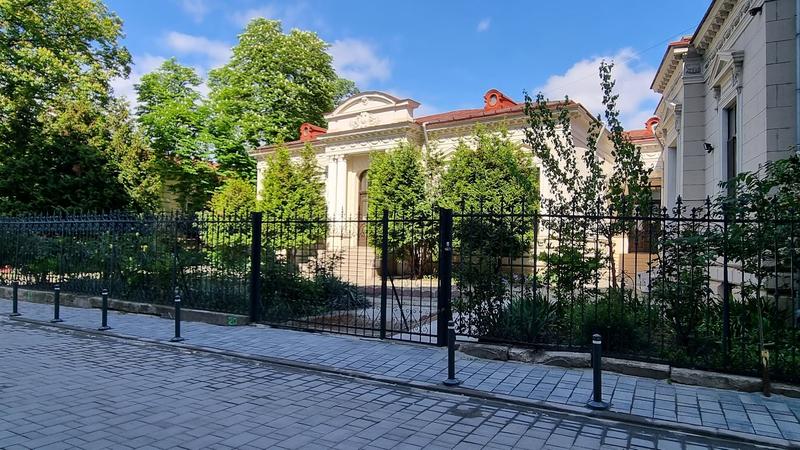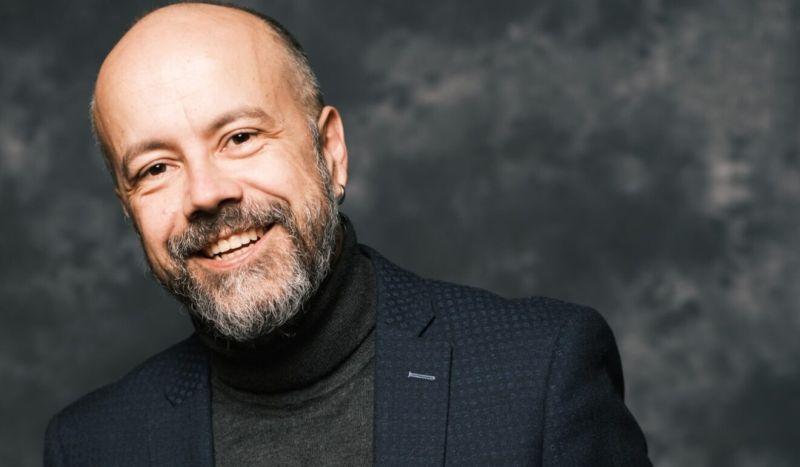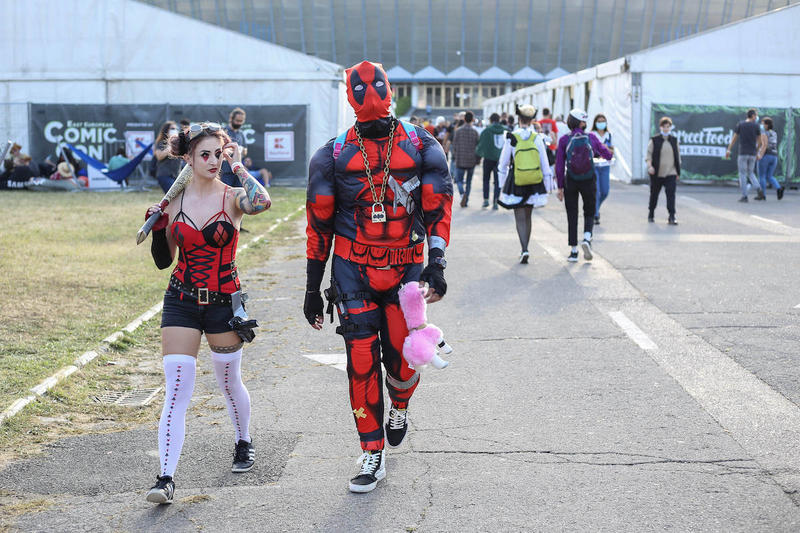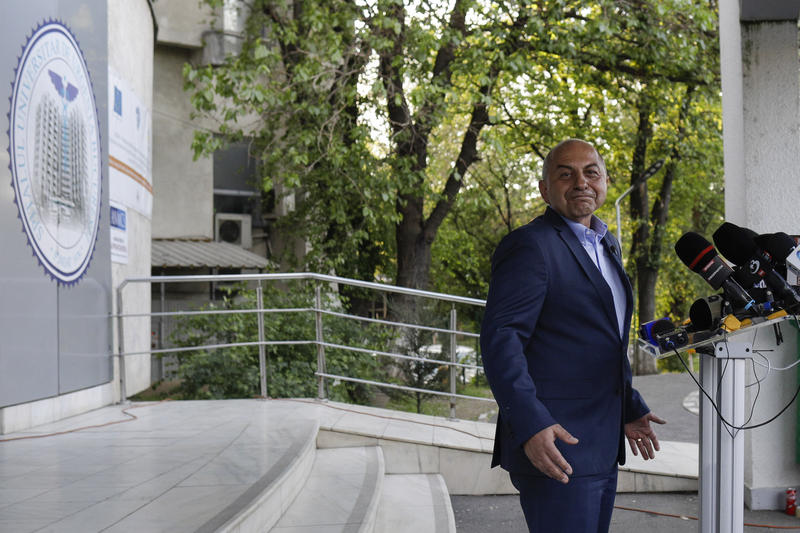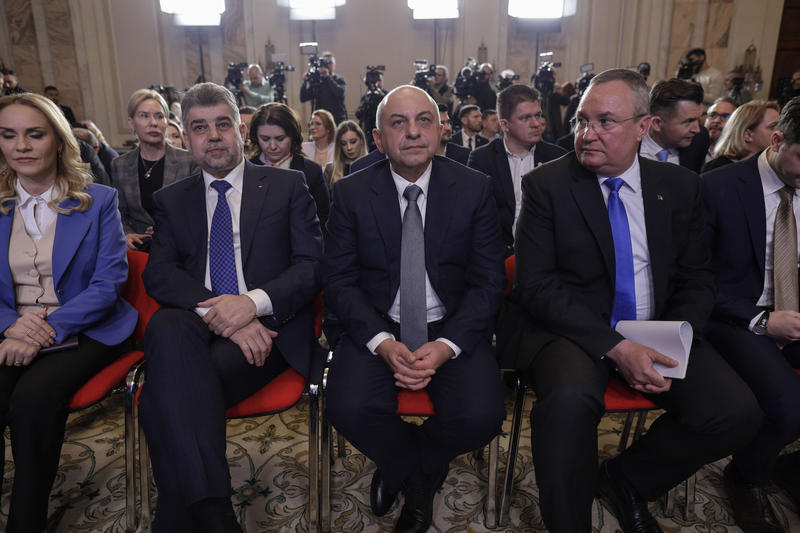Pavel Stroilov is the primary source of the documents stolen from Gorbachev Funadtion’s archive, which revealed during the last years the backstage of USSR’s fall and the deals stroke by the European leaders in the '80s. In an exclusive interview for HotNews.ro, Stroilov tells about Francois Mitterand and Mihail Gorbachev’s plans to create a Socialist European Confederation, Margaret Thatcher's opposing Germany's reuinification and the Iliescu-Gorbachev complicity.
Crina Boros: Pavel, how did you manage to get secrets out of the Soviet archive from Russia?
Pavel Stroilov: The archive was huge. Nobody at Gorbachev Foundation knew what I was doing. I took the documents with me to England, when I visited a friend and it was then when I asked for a political asylum.
The reason why I had to do this so urgently was the scandal around the Romanian part of the collection. Before the last elections, President Iliescu threatened a libel lawsuit against my friend Vladimir Bukovsky, who told the press about Iliescu’s Soviet connections. This was a big political battle some five or six years ago, so we could not hold the documents any longer. With my permission, Vladimir published the most important papers on Iliescu – without naming me as the source of the documents, as I was still in Russia. Then Iliescu shut up about a lawsuit, and soon afterwards, lost the elections.
Since then, however, we’ve discovered some additional evidence about him in other parts of my collection. One transcript records an exchange between Gorbachev and the Bulgarian leader Lilov. Lilov said something like "Afterall, Iliescu is doing fine in Romania, for us." And Gorbachev said "Hush! We don’t want to advertise our closeness to Iliescu", in other words, "Yes, he’s doing fine, but we don’t want to advertise that he’s close to Moscow."
Then there is a lot more evidence on that discovered by other people who worked on it before. The whole Revolution in 1989 was masterminded by Moscow. They plotted against Ceausescu: he was too tough, he wouldn’t listen to them, and he was too infamous. A Romanian leader like him did not fit into their plans for Europe any longer. So they decided to replace him with Iliescu, who has always been pro-Russian.
CB: Was everything planned by the KGB?
Pavel Stroilov: Yes. And the National Salvation Front was absolutely under Soviet control.
Apparently, Gorbachev and Iliescu were at university together. Otherwise, he could not be sure the new leaders would be loyal to him, because the general plan was to push Gorbachev’s old mates into the positions of East Europe’s leaders. For example in Czechoslovakia, where Gorbachev’s candidate failed to get through, it just went out of control.
France, Russia and the Socialist European Union
CB: In this case, did Romanian become a democracy by accident?
Pavel Stroilov: When the crowds of people got into the streets, the Soviets lost control. This is how democracy works.
CB: How could the Kremlin fail to foresee this?
Pavel Stroilov: Their plans of the fake revolution seem somehow incomplete. There must have been another element in this plan, something they hoped would stabilise the new regimes like Iliescu’s, something that would help them keep things under control in spite of the whole revolution.
That element was what Gorbachev called Common European Home. And Francois Mitterrand called it European Confederation. It was based on the old Cold War idea of ‘convergence’: that is to say, Soviet Union and East Europe were to become more and more democratic, while West Europe would be more and more socialist. And when it finally merged, it would result in a kind of moderate socialist utopia.
The United Socialist Europe, that’s basically what it was. Gorbachev and Mitterrand were talking all the time of how to make their Common Socialist European Home. The transformation of the European Community went wrong because, of course, the Soviet Union collapsed and Russia never entered the European integration. But the plan has a lot of impact even on today’s Europe, because basically, the EU is a moderately socialist structure of this kind.
So, that was the element which would allow them to keep East Europe under control. Gorbachev and Mitterrand said often in their conversations that East Europe should be sandwiched between European Community and the Soviet Union, so that it would be kept under the Soviet influence. Or European influence, which would not make much difference, because Soviet Union and United Western Europe were now in league with each other. That way, the regional countries would have nowhere to go. As Mitterrand once said, Paris and Moscow should have been the two ‘poles’ of the new Europe, two centres of power jointly controlling it.
Germany's reunification, discouraged by the West
CB: What was going to happen with Germany, fragmented at that stage?
Pavel Stroilov: The unification of Germany would be a part of this, too. It was meant to happen gradually within the framework of the bigger unification of Europe. Their plan was that Germany should have been united somewhere at the beginning of the 21st century. But the unification of Germany should not have happened before the unification of Europe. The two were to be ‘synchronised’. That’s exactly what they say in the transcripts I got. But it also went out of control, and for the same reason: because millions of ordinary Germans thought otherwise, and went out to the streets to get their way.
CB: According to your documents, Mr. Thatcher, then British PM, didn’t want a reunited Germany either
Pavel Stroilov: Yes. Her mistake was that she viewed the situation from the point of view of the second world war. She failed at first to understand that it was the decisive battle of the Cold War. It wasn’t about Germany at all, it was about defeating communism and ending the Soviet occupation of Europe. So, she made some big mistakes. But she reviewed her position and backed a unified Germany into NATO.
But Mitterrand knew perfectly well what he was doing. He was completely aligned with Gorbachev. If Germany unified before Europe, it would have jeopardised Gorbachev’s plans and particularly Mitterrand’s. United Germany became another centre of power, rather than just a rich province under a Franco-Soviet condominium. His idea was to remain on top, with or without Gorbachev. And the results are somewhat mixed: France is now in top 2 in the EU, but so is Germany. And the EU is socialist, but probably less socialist than Mitterrand wanted it to be.
CB: But Thatcher couldn’t have known of their plans…
Pavel Stroilov: No, but they actually got her to agree to the slowdown of the unification of Germany. The idea of a unified neutral socialist Germany is not new – that was the original idea of Stalin’s and an objective of the Soviet foreign policy ever since. But when the people came out on the streets, it jeopardised everything.
The Germans demanded for their Federal Republic to stay as a free and democratic Western nation, and a member of NATO. And Thatcher, to give her due, supported them at that point. Gorbachev and Mitterrand tried to find a way around it. All their conversations of that period focus on making NATO a political organisation rather than a military one, an organisation no longer opposed to the Soviet Union, but oriented towards cooperation with it.
There is a conversation between Gorbachev and Bush about this. Gorbachev suggests that Germany could be both in NATO and part of the Warsaw Pact. But the American administration, Bush and Baker, they didn’t have this much imagination. They told Gorbachev that the idea sounded ‘somewhat schizophrenic’. At the end of the day, the idea was buried simply because the Warsaw Pact simply collapsed.
Bush told Gorbachev that he should not worry, because NATO was not going to be anti-Soviet. Gorbachev asked: "Well, if it isn’t anti-Soviet, against who is it directed?". And Bush says: "Against instability". Then Gorbachev says: "Well, maybe we should enter NATO as well." Bush did not reply to that in that particular conversation, but after a while, the Western response was that it was actually a rather good idea.
We will not encourage the de-communisation of East European states
CB: Can we talk about the West's victory over East?
Pavel Stroilov: There was no victory, the Soviet Empire collapsed by itself. As for Thatcher, she was supporting Gorbachev more publicly than she did privately. From their conversations, it seems they argued rather fiercely all the time. In public, that wasn’t obvious. People say this is exactly how she treated all her friends – so she really saw him as a personal friend. And she was mistaking.
Just to illustrate: She trusted him with her secrets in off the record conversations, but of course it was very naïve to think that Gorbachev could keep common secrets with Thatcher from his own Politburo. He had to report it to other Soviet leaders. One could not be personal friends with Gorbachev because he was not acting as a person. He was simply a representative of the system, and she failed to realise that. Hence were all those tragic mistakes.
If there has been a West’s victory over East, Thatcher did contribute a lot in her earlier years. It was precisely the tough policy of Reagan and Thatcher that forced the Soviet Union to start reforms. And then, after making Gorbachev a reformer by force, she was hoodwinked by her own creature. She made tragic mistakes, for which all of us would pay dearly.
I think she was honest, even if mistaken. But She told him [n.b. what she wanted to be off the record but was later written from memory] that she didn’t want a de-stabilisation of the Eastern Europe, of the Warsaw Pact and that „we are not going to encourage the de-communisation of the East European states”. This is what is difficult to justify.
CB: Margaret Thatcher told Reagan that she liked Gorbachev and that they “could do business” together
Pavel Stroilov: It’s not Gorbachev’s invention, it’s a trick developed by psychologists and used by KGB: when you talk to a person, you just pretend to be a copy of them, and they will trust you. All the Soviet leaders were told by the KGB to use this at summit-meetings.
A classic example is what James Carter states in his memoirs about the negotiations with Leonid Brezhnev in Wien and he recalls Brezhnev saying: "If we don’t save the world from another war, God will not forgive us". Can you imagine Brezhnev saying God? I think he trained quite a while in front of the mirror. They knew Carter was religious, they played on that, and now Carter was convenced he had converted Brezhnev to Christianity.
With Thatcher, he pretended to be a Russian version of Thatcher. Gorbachev told thatcher he was doing in the USSR exactly what she was doing in Britain: fighting wastfullness and inefficiency of socialist economy. And then he goes to the Pope in Rome and starts talking about the peace, the universal good, and the spiritual mission of the Slavic people. Then he goes to Mitterrand and makes conspiracies to create socialist Europe under Franco-Soviet control. Then he goes to Kohl, and miraculously turns into a pure-hearted, loyal, friendly chap Kohl-style.
After the fake 1989 revolutions, the intelligence elite kept its positions
CB: Talking about the fall of USSR, with the Soviets not having money to sustainEast Germany, thinking of tearing down the wall themselves, and not having money to send the army in the countries where protests started, with the West wanting the USSR to have control over East Europe, it seems that the West almost had no credit in its fall
Pavel Stroilov: It does have. It was precisely Regan and Thatcher who forced the Soviets to adopt reforms. They had no choice but to adopt the perestroika. As a result of Reagan's and Thatcher's tough policies, in the beginning of the 1980s, the Soviet leaders realised they didn’t have enough money for their global ambitions. This meant they had to try and make their economy work. They needed better relations with the West. Gorbachev himself said that perestroika wasn’t his idea. He was chosen for it because they needed someone charming, energetic and (by Soviet standards) relatively young to do this job. I have met him, and he does make a good impression as a person.
And at that point, the Western view of the Soviet Union changed completely – even the view of Margaret Thatcher. Absurdly, they decided that Gorbachev was on their side, that he was their friend, that he deserved a lot of credit for removing the Soviet threat. They did not really care about anything else – and of course, this was very short-sighted. This is precisely why that ‘elite’ of collaborationists stayed in place, not only in the East, but in the West as well; all those whom Vladimir Bukovsky rightly calls ‘Petains and Quislings of the Cold War’.
CB: In Romania, former members of the communist party have roles in the parties formed or revived after 1989
Pavel Stroilov: That is what happened all over Europe, precisely because we did not open archives and did not establish the historical truth about communism – but not only this. To a high extent, this was the whole point of those fake revolutions organised in 1989 in Eastern Europe: to give communists a soft landing, so to speak.
True, it failed to keep the communist system in place, but it provided them free hand to take control of the money, economy, press, academy – at the crucial months of history, when the new national elites were formed. There was no question of sending communists to the dock for murdering thousands of people. Instead, they were allowed to choose their place in the elite of the new democratic societies.
There was no real de-communisation, so victory over communism never really happened. Communism existed in several capacities: it is a regime, it is a political movement, and it is mafia. No doubt, it did collapse as a regime, it has received a strong blow as a political movement; but and it is has only flourished as a political mafia.
CB: You mean KGB?
Pavel Stroilov: KGB is running Russia and the post-communist communist corruption as a consequence of our failure to address the issue of de-communisation. I can’t blame the West alone, it’s also something that we, in the East, should have done. But as the people of the free world, they have failed to finish the Cold War. In the case of WWII, they demanded unconditional surrender. But in the case of the Cold War, they were prepared to accept a mere ‘perestroika’, some ‘liberalisation’ of the regime, some form of socialism with a human face.
The reason for it is that they never saw communism like us, like the pure evil that it is. For them, it was just one of the problems. They were looking for a solution which would make it harmless to them. It was short-sighted. They failed to realise that socialism was a huge epidemic, which not only left Russia and Eastern Europe in ruins, but also undermined and corrupted the Western society to an enormous extent. It is even more difficult to recover from it than from fascism or Nazism.
CB: What’s the explanation?
Pavel Stroilov: Nazism was more direct in its reliance on brute physical force. It was also totalitarian, but it was a mere shadow of communism. Communism poisons the whole fabric of the society. It deliberately makes everyone an accomplice to its crimes. It teaches children to report on their parents to the secret police. It destroys all the links on which the society is based.
But in the aftermath, the only way to recover is to rethink what you’ve been through. It requires a very painful process of – I don’t really want to bring religion into this, but the only correct word I can find – repentance. You have to realise, you have no one to blame but yourself. You have to condemn your past and reject it. Then, and only then, you can try and re-build your civilisation from ruins.
There can be no recovery, no way forward unless the culprits are condemned, the victims are honoured, the historical truth is established, and the lessons are drawn. That is why there is hardly a more important task in today’s world than to unravel the communist secrets and make them public. All the secret archives must be opened, down to every single document. Whoever keeps them secret is covering up terrible crimes. I am proud I have done my bit for that by stealing this particular archive, and I can hardly hope to do anything as important in my life again.
